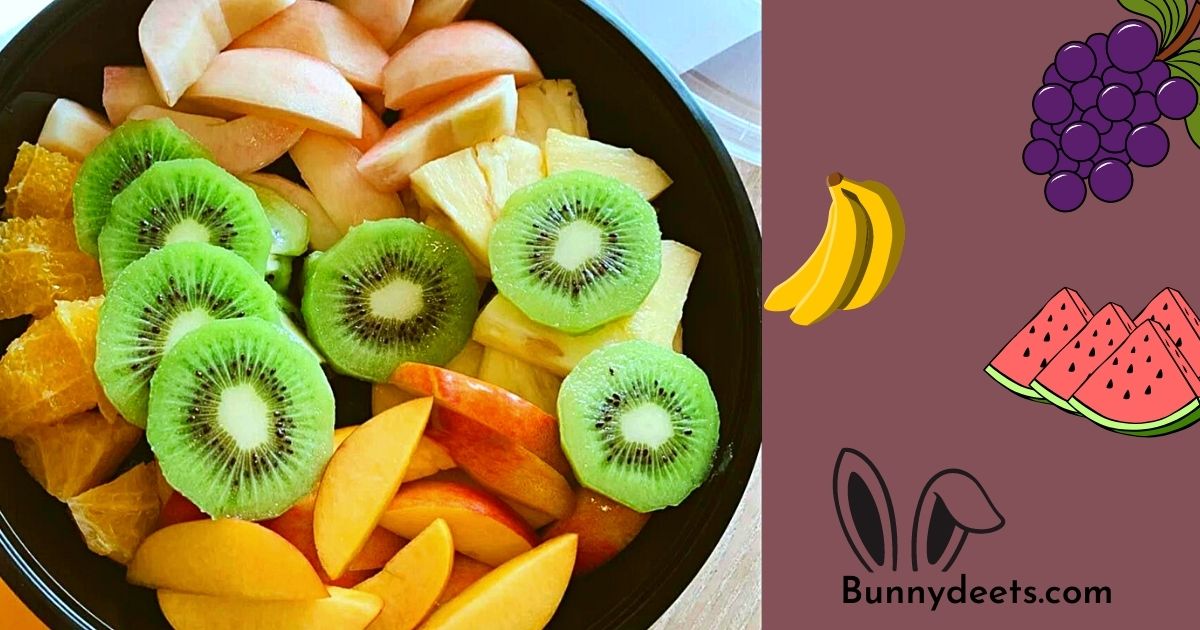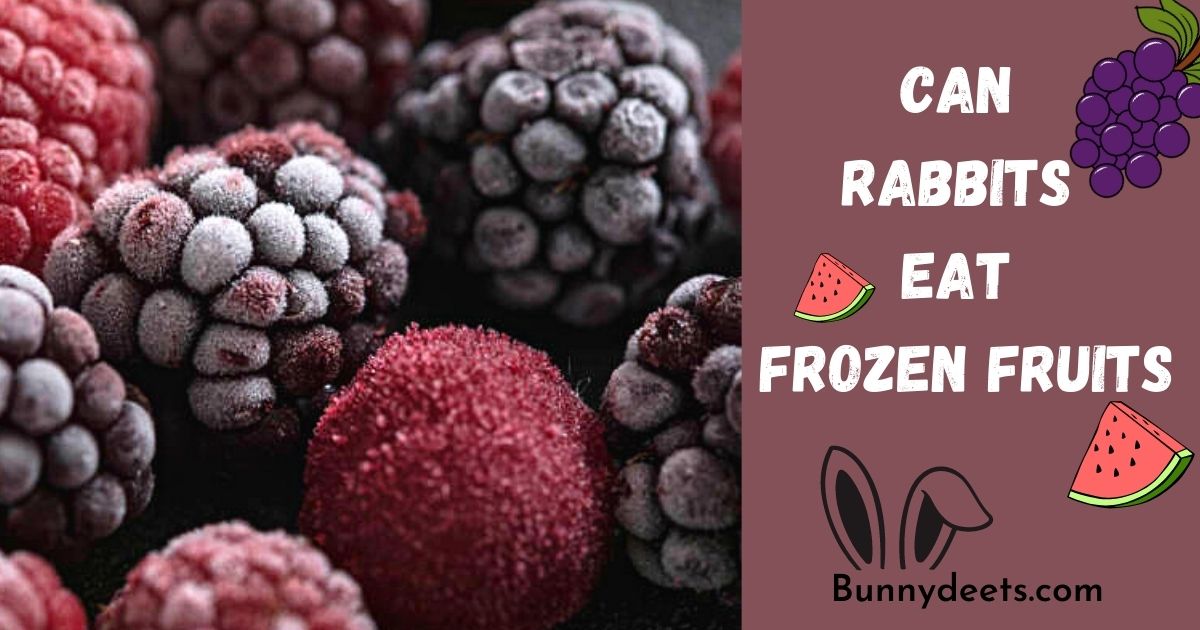Rabbits are herbivores and need a diet that’s high in fiber to keep their digestive system healthy. While fresh vegetables and hay should make up the bulk of a rabbit’s diet, fruits can be a tasty and nutritious treat. Can rabbits eat frozen fruit?
Rabbits can eat frozen fruits. They love crunchy treats that can help keep their teeth filed and healthy. However, you should consider avoiding frozen fruits with high sugar content. This is because sugar isn’t naturally part of rabbits’ diets and can upset their digestive system.
In this article, I will enlighten you on the benefits of frozen fruits and how safe it is for your bunny. I will also share the specific types of frozen fruits that are safe and unsafe for your rabbits.
Can Rabbits Eat Frozen Fruit?
Frozen fruits are healthy for rabbits as they help keep them cool during hot weather. It also provides essential nutrients that can help keep your rabbit’s external and internal organs functioning. Frozen fruits also help to keep a rabbit’s teeth filled and help prevent overgrowth.
During the summer, rabbits can easily become overheated, therefore frozen fruits are a preferred method for rabbits to cool off while providing ideal nourishment for them.
I use frozen fruits to help regulate my rabbit’s temperature during the summer. I would recommend it to any pet rabbit owner.
Almost any fruit can be frozen, including bananas, blueberries, mango, kiwi, and many more. This helps to create an opportunity to diversify your rabbit’s diet without imposing any health risks.
Can Rabbits Have Frozen Fruit?
Fruits are generally safe and healthy for rabbits as a treat that should be fed to rabbits in moderation either fresh or frozen.
Frozen fruits are an excellent source of fiber, vitamins, and minerals that can help keep your rabbit’s digestive system running smoothly. However, rabbits should not eat frozen fruits as a daily diet because they contain high amounts of fruit sugar (fructose).
Frequently feeding rabbits fruits can cause intestinal distress and also lead to obesity and dental issues.
When feeding frozen fruits to rabbits, you should remove all high-sugar fruits from their diet. This includes apples, bananas, citrus fruits, grapes, Kiwi, mangoes, and, Peaches.
Can I Give My Rabbit Frozen Fruit
It is generally safe to give frozen fruit to rabbits as an occasional treat, but there are a few things to keep in mind.
Firstly, it Is important to thaw the frozen fruit before giving it to your rabbit to avoid any potential digestive issues. You can thaw frozen fruit by leaving it in the refrigerator overnight or by running it under cool water for a few minutes.
Secondly, not all fruits are safe for rabbits to eat, and some may even be toxic. So, it’s important to check the safety of each type of fruit before offering it to your rabbit. For example, rabbits can eat blueberries, strawberries, and raspberries in moderation, but should avoid grapes and raisins, as they can be toxic to rabbits.
Lastly, while fruit can be a healthy addition to a rabbit’s diet, it’s important to remember that it should only be given in small amounts as a treat. Fruit is high in sugar and can cause digestive problems if overfed.
Benefits of Frozen Fruits To Rabbits
- Frozen fruits usually contain vitamins, minerals, and antioxidants that can help prevent diseases and have beneficial effects on a rabbit’s body.
- Frozen fruits are healthy for your rabbit’s teeth. it helps keep their teeth sharp and filed
- In the summer, rabbits become hot easily, so frozen fruits are a good way to help keep their body temperature regulated.
- Frozen fruits are a great way to introduce new varieties of flavors to your rabbit.
- The freezing process helps slow the enzymes that are responsible for ripening and over-ripening the fruits.
- Frozen fruit doesn’t benefit your rabbits alone, it also helps us humans save more money and fruits.
Which Frozen Fruit Can Rabbits Eat?


1. Blueberries
Blueberries are safe for rabbits either fresh or frozen. It provides rabbit with vitamins, minerals, and antioxidants that can help prevent diseases and keeps your rabbit’s digestive system functioning.
Blueberries are also low in sugar, low in calories, and high in fiber. They also contain a considerable amount of protein for rabbits.
2. Raspberries
Frozen raspberries are safe for rabbits to eat as long as they are without additives. Just like blueberries, they are safe for rabbits and are also a good source of vitamins and antioxidants.
They are also high in fiber, making them an excellent treat for rabbits that need help with their digestive system.
3. Strawberries
Rabbits can eat strawberries both fresh and frozen. Although they do not have as many antioxidants as blueberries or raspberries, they are still packed with nutrients that can help prevent health issues.
4. Watermelon
Watermelon is also safe for rabbits as long as it is frozen without additives. Frozen watermelon is a great option for overweight rabbits that need to lose weight. It is high in water content, making it an excellent choice for rabbits that need to lose weight
5. Mango
Frozen mangoes are not harmful to your rabbit as long as they are served in small quantities. It provides your rabbit with the same essential nutrients including vitamins, carbohydrates, and proteins.
Frozen mango also contains a high level of fruit sugar that rabbits’ health does not require. hence, it should be fed as an infrequent treat.
Frozen Fruits To Avoid Feeding Your Bunny
Although frozen fruits are good, a few should be avoided when feeding them to your rabbits. While most frozen fruits might be packed with vitamins and minerals, some contain high fructose levels which can cause health issues like digestive problems, obesity, and dental issues.
Generally, fruits that are dangerous to rabbits’ health are those that contain citric acid or high sugar levels. These fruits should only either be ignored or fed in very small quantities.
1. Apples
Apples are one of the fruits with high sugar levels so, they should be avoided, or fed with limitations. Frozen apples can be fatal to rabbits that have sensitive digestive systems.
2. Citrus fruits
citrus fruits like oranges, lemons, and limes are dangerous for fresh or frozen rabbits. Although these fruits are packed with nutrients, their high acidity can be fatal to rabbits.
3. Cherries
cherries are high in sugar, making them bad for rabbits. Rabbits should avoid frozen peaches as well. While they are low in sugar, they also contain cyanide, which is fatal in rabbits.
Other fruits to avoid are pears, grapefruits, and pineapples. These also contain high amounts of sugar, making them dangerous for rabbits.
Can Rabbits Eat Frozen Bananas?
Rabbits can eat frozen bananas. Bananas are a good source of fiber, potassium, and other vitamins and minerals that are beneficial for rabbits. However, it’s important to note that bananas are high in sugar, so they should only be given to rabbits as a treat in small amounts.
When feeding frozen bananas to rabbits, it’s important to thaw them first to avoid any potential digestive issues. Also, make sure to remove any peels before giving bananas to your rabbit as the peels are not easily digestible and can cause gastrointestinal problems.
Can Rabbits Eat Frozen Blueberries?
Rabbits can eat frozen blueberries as an occasional treat in moderation. Blueberries are a good source of fiber, vitamins, and antioxidants, which are all beneficial for a rabbit’s overall health.
However, it’s important to note that like any fruit, blueberries are also high in sugar, so they should only be given to rabbits in small amounts.
When feeding frozen blueberries to rabbits, it is best to thaw them first to avoid any potential digestive issues. Frozen blueberries can also be a great way to help keep your rabbit cool during hot weather, as they can provide a refreshing and hydrating snack.
What to Look For When Selecting Frozen Fruits?
Just like fresh fruits, frozen fruits also need to be mint and organic. If you want to give your rabbits frozen fruits, it is best to buy them organically, wash them, and then put them in the freezer. This way, it will help suppress any bacteria that can harm your rabbit.
While fresh fruits are convenient, they tend to spoil quickly but frozen fruits are more convenient because they last longer and can be served regularly.
Also, when choosing frozen fruits, ensure that they do not contain additives, or syrup, and are not heavily sugared. These can be dangerous for rabbits’ health and can cause obesity, dental problems, or digestive issues.
Conclusion
Generally, it is safe to feed your rabbits frozen fruits. Frozen fruits are usually filled with vitamins and minerals, making them an excellent source of nutrients and fiber. But when selecting frozen fruits, make sure that they do not contain any added sugars, citrus, and syrups.
It is advised that you freeze the fresh fruits yourself and give them to your rabbit as a treat. This way you are sure there are no dangerous chemicals or preservatives in the fruits. Frozen fruits are also a great way to keep your rabbit cool, healthy, and happy.

